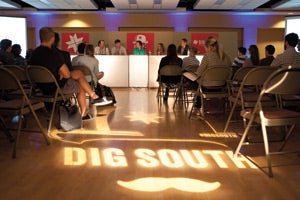AS CHARLESTON DEVELOPS a diverse, modern and complex economy, its oldest university is evolving to meet the demands of this exciting new frontier.
While the College remains committed to supporting and nurturing our city’s traditional assets – such as its port, thriving arts community, African American history, expertise in historic preservation and urban planning, and tourism industry – a handful of new and emerging assets also demand our attention. The emerging assets include the industries of aerospace, digital media and technology, and health care and biosciences.
I am particularly excited about the opportunities that exist for the College in the area of digital media and technology.
Universities have always been an essential element in the development and growth of technology-driven regions. Well-known examples include Stanford in Silicon Valley, the University of Texas in Austin, and UNC Chapel Hill in North Carolina’s Research Triangle.
The College can and should play a similar leading role in the development of Charleston’s knowledge economy. The rapid expansion of the high-tech sector in Charleston – prompting some to dub our region “Silicon Harbor” – has created incredible opportunities for the College to become the academic hub of the digital economy and the primary supplier of computer science graduates.
The Charleston Metro Chamber of Commerce’s Center for Business Research estimates that Charleston’s digital economy directly supports 11,000 jobs. And Charleston is among the top 10 fastest-growing cities for software and Internet technology, according to the Charleston Regional Development Alliance.
Currently, 250 small- to medium-sized software firms, including Blackbaud, Benefitfocus, PeopleMatter, BiblioLabs, TwitPic, SPARC and BoomTown, are based in Charleston. This is up from just a handful of such firms a decade ago.
Larger companies also see the opportunities in Charleston. In January, Google announced plans to invest an additional $600 million to significantly expand its data center near Goose Creek, S.C. In April, Boeing Charleston announced plans to invest an additional $1 billion and hire 2,000 more employees in Charleston, including 600 high-tech workers to support consolidation of the company’s information technology division.
But job opportunities are only part of the equation. Creative types also seek locales that offer a high quality of life. And Charleston’s mix of beaches, climate, nightlife, cuisine, music scene and other attributes are helping to lure a younger demographic that includes digital artists and technology gurus.
The website Under30CEO.com recently ranked Charleston as No. 3 on a list of the best small cities in the country for entrepreneurs. The website lauded Charleston’s growth in the information technology field and gave credit for
much of the boom to the Charleston Digital Corridor.
Launched by the City of Charleston in 2001 and led by Executive Director Ernest Andrade ’85, the Digital Corridor is a nonprofit corporation designed to attract, nurture and promote Charleston’s knowledge economy. Over the past five years, the public-private initiative has worked with 51 companies, resulting in the creation of 200 jobs and nearly $15 million in payroll.
The College plans to become the leading supplier of computer science graduates for the burgeoning high-tech industry in Charleston. Locally based high-tech companies are urging the College to produce more computer science graduates. The CEOs of these companies tell me they could easily absorb 200 of our computer science graduates each year. That’s an untapped opportunity considering that we awarded just 26 undergraduate degrees in computer science in 2012–2013.
Chris Starr ’83, chair of our Department of Computer Science, believes that the liberal arts and sciences education our computer science graduates receive gives them a leg up on their peers from more narrowly focused professional programs.
“Computer science and data science students at the College become the best software problem solvers because they have had the added advantage of a liberal arts education across a broad spectrum of the humanities,” says Starr, who earned his degree in mathematics from the College. “Our graduates are positioned to think about problems from multiple academic perspectives.”
Beyond educating current and future generations of computer scientists, the College is also making plans to become more involved in the business side of the high-tech industry. A planned Digital Technology Incubator and Center at the College will focus on the commercialization of digital and interactive technologies for software applications in medicine, health care, education, manufacturing, entertainment and the arts. The center would be funded with a $2 million appropriation from the South Carolina General Assembly and an equal amount of private funding.
Charleston’s digital economy is still in its infancy compared to established technology meccas like San Francisco and Austin. But that will change as more and more high-tech workers and entrepreneurs from around the country and the globe learn about the exciting opportunities that exist in the Holy City.
One initiative that is already helping to draw such attention is Dig South. Part technology conference, part music festival, Dig South is aimed at exploring the intersection of technology, social media, marketing and the arts. The inaugural event took place in the College’s TD Arena and other nearby venues in April.
Modeled after Austin’s famous South by Southwest (SXSW) conference, Dig South drew more than 3,000 attendees, representing more than 20 states. Planning is already under way for next year’s event.
Dig South Founder and Executive Director Stanfield Gray, whose day job is director of strategic communications in the College’s Division of Marketing and Communications, says there’s a definite buzz surrounding Charleston’s tech scene right now.
“This sector of our economy is roaring,” says Gray. “What we’re talking about are jobs of the future, high-tech jobs, and they’re right here in our backyard.”






